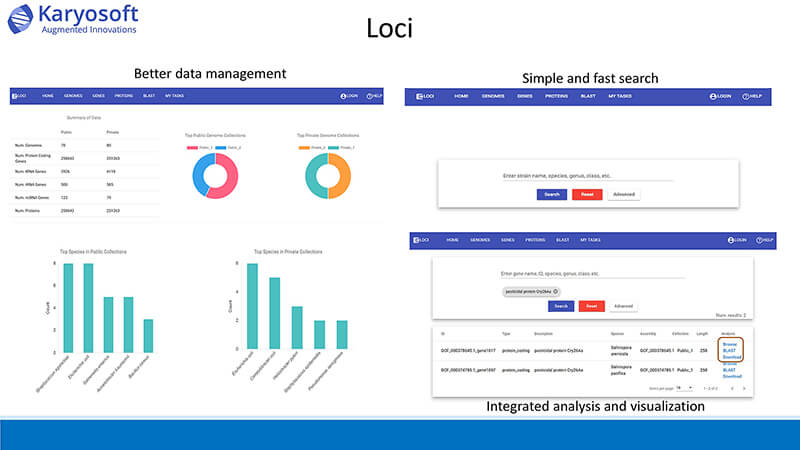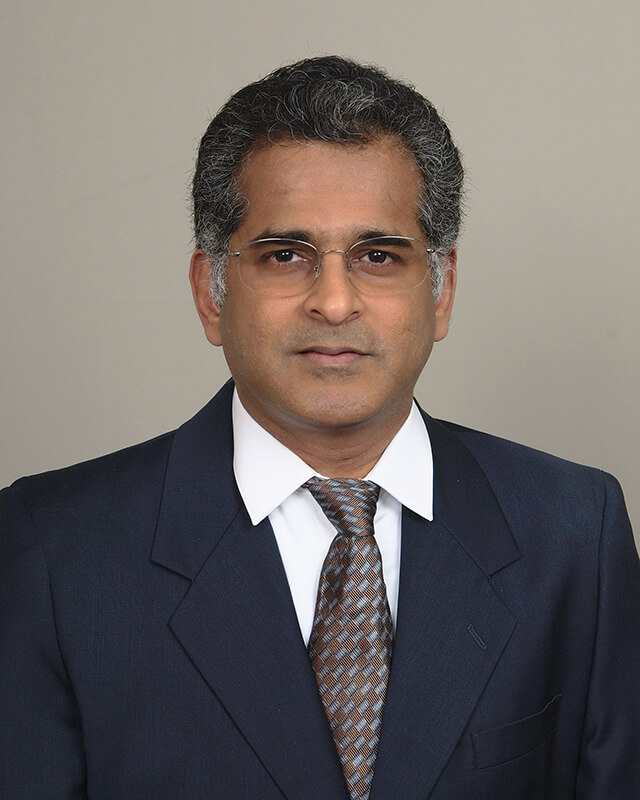September 7, 2018
Invisible friends: Startup developing software to help understand vast data of microbiomes to solve world problems
 Karyosoft founder Rajesh Perianayagam created Loci, a web-based, time and cost-saving software solution for microbial genomics data. The goal is to give microbiome biologists more time focusing on their research and increase the value of their organizations by minimizing data loss. (Image provided)
Download image
Karyosoft founder Rajesh Perianayagam created Loci, a web-based, time and cost-saving software solution for microbial genomics data. The goal is to give microbiome biologists more time focusing on their research and increase the value of their organizations by minimizing data loss. (Image provided)
Download image
WEST LAFAYETTE, Ind. – A Purdue University-affiliated startup is developing an intelligent software platform aimed at helping biologists to use microbes, the microscopic organisms that live in, on and around humans, plants, animals and more to cure diseases, improve crops and make livestock healthier.
Rajesh Perianayagam is the founder of Karyosoft, which created Loci, a web-based, time and cost-saving software solution for microbial genomics data. The goal is to help microbiome biologists to “make the difference” faster, freeing up bioinformaticians’ time and increase the value of their organizations by minimizing data loss.
Perianayagam believes his software will help biologists who are researching for ways to use microbes to cure cancer, diabetes, and Crohn’s disease, to produce higher yielding crops and to improve the welfare of cattle and sheep by decreasing bloating and lactic acidosis and more.
The National Cancer Institute estimates 1.74 million new cases of cancer will be diagnosed this year and 609,640 people will die from the disease, and the American Diabetes Association estimates that 9.4 percent of Americans have diabetes.
There also is increasing concern about our ability to feed people with the world population on pace to exceed 9.5 billion by 2050. The U.S. Department of Agriculture estimates there already are 870 million people around the world who do not have access to a sufficient supply of nutritious and safe food. The USDA also says animal disease is one of the greatest threats to animal agriculture.
Because of the availability of cheaper next generation sequencing (NGS) technologies, huge amounts of genomics data are being generated from various microbes which cause challenges for organizations for storage, management, and analyses. This scenario will get worse in the future as 99.99 percent of 1 trillion microbes are yet to be discovered which will be possible with NGS technologies.
 Rajesh Perianayagam
Rajesh Perianayagam
Download image
“One of the problems is that often biologists don't have strong computational skills. Hence, they are dependent on experts with computational skills (bioinformaticians) to retrieve genetic information from genomics data,” Perianayagam said. “This leaves a huge gap between data and biologists which causes a delay in innovations and adds extra workload for already busy bioinformaticians. We want to empower biologists by connecting them directly to genomics data in real time and providing customized simple to use analytics through the user-friendly interface so they can transform data into innovations and knowledge faster; also, want to reduce bioinformaticians’ workload and save them time so they can focus on more challenging problems.”
Another issue is data loss that is due to improper storage of the sequence data. A simple analogy: Imagine a library of uncatalogued books. Data are stored on the externalhard drive, thumb drive, a localcomputer which are not the right places to store the data generated spending hundreds of thousands of dollars from precious biological samples. Because of that, scientists spend 80 percent of their time on just preparation-organizing and collecting data instead of spending time on discoveries. Organizations are spending billions of dollars on data preparation.
“We learned interviewing experts conducting microbiome research that biologists could reach their project goals at least 25 percent faster and bioinformaticians could save up to 50 percent of the time if there is a suitable software solution is available,” Perianayagam said.
“These lessons from potential customers are the main motivation for developing our innovative solution Loci. Loci, being highly scalable, minimizes data preparation time by bringing all their genomics data together in one place and minimizes data loss that increase the value for their organization. Also, Loci helps biologists to efficiently organize, manage, analyze and visualize microbial genome sequence data through a user-friendly interface.”
Researching microbiomes is not easy because there are a lot of variables. Because of improvements in methods to sequence DNA, scientists have a greater understanding of the biology, diversity, and evolution of microbes. But there is still much to learn about these vast communities living in the humans, plants, animals and more. For starters, scientists want to know how many types of bacteria live in and around living organisms and their environment; so to use that knowledge for improving the quality of life.
Perianayagam believes Loci can help biologists to find answers to many of those questions by directly connecting them with genomics data and helping them to find novel solutions for improvement of crops, animals, humans, and overall life.
“Our vision is to become industry leaders in providing next generation customized software solutions that make complex data analytics simple in life sciences. To do that, first, we are developing a platform to bring all genomics data together,” Perianayagam said. “Today, science strives to cover advances that reveal the specific ways in which the microbiota influences the physiology of the host, both in a healthy and in a diseased state. Researchers also are trying to determine how the microbiota may be manipulated, either at the organismal or molecular level, to improve the health of the host.”
Perianayagam said what sets Karyosoft apart is its focus on microbiome research.
“We thought it is a great place to be because this research is in its infancy stage. There is a huge difference between what is discovered in microbiome world compared to what is not discovered,” he said. “Another differentiator is that we aim exclusively on genome data storage, management, andcustomer-specific analytics; not on raw data assembly and annotation. This exclusive area of focus in customer’s workflow saves time for both biologists and bioinformaticians; saves cost through increased efficiency and increases the value to the organizations by bringing all data in one place and minimizing the data loss.”
He said taking part in programs at the Purdue Foundry, an entrepreneurship and commercialization accelerator at the Burton D. Morgan Center for Entrepreneurship at Discovery Park on the Purdue campus and national NSF-I-Corps, helped to get the company off the ground, and market validation helped him to understand the needs of the customers and where to focus the business.
About Purdue Foundry
The Purdue Foundryis an entrepreneurship and commercialization accelerator in Discovery Park's Burton D. Morgan Center for Entrepreneurship whose professionals help Purdue innovators create startups. Managed by the Purdue Research Foundation, the Purdue Foundry was co-named a top recipient at the 2016 Innovation and Economic Prosperity Universities Designation and Awards Program by the Association of Public and Land-grant Universities for its work in entrepreneurship.For more information about funding and investment opportunities in startups based on a Purdue innovation, contact the Purdue Foundry at foundry@prf.org.
Writer: Tom Coyne, 765-588-1044, tjcoyne@prf.org
Source: Rajesh Perianayagam, 317-689-8493, rajeshpn@karyosoft.com
